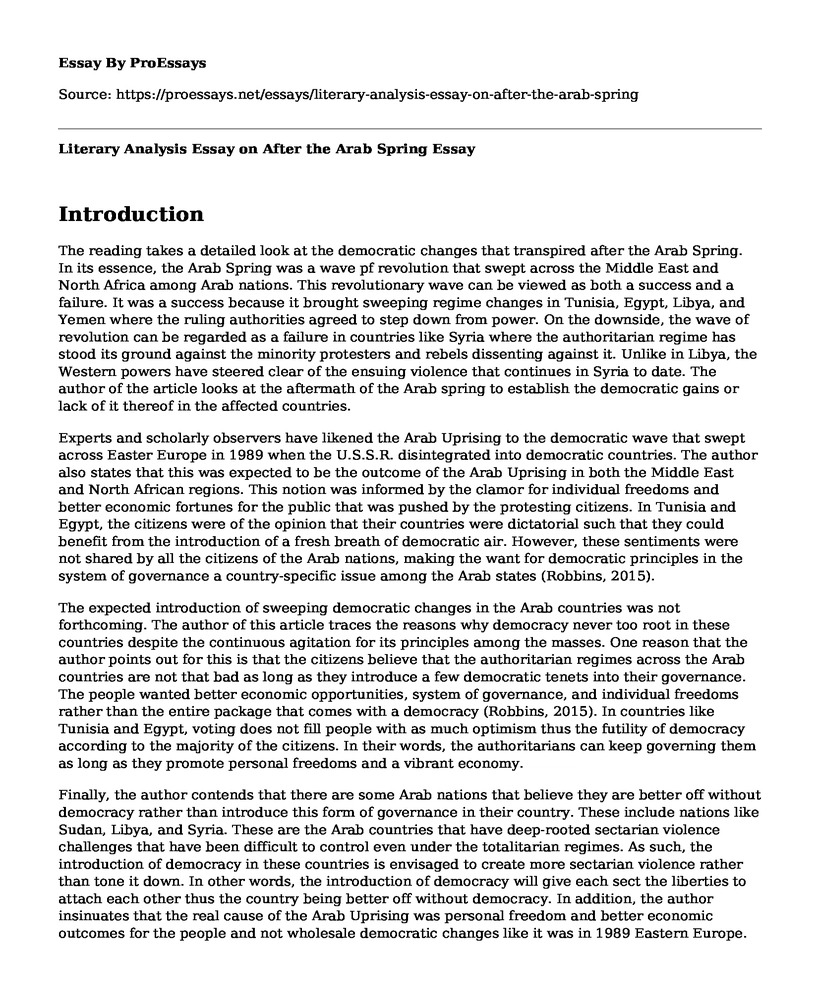Introduction
The reading takes a detailed look at the democratic changes that transpired after the Arab Spring. In its essence, the Arab Spring was a wave pf revolution that swept across the Middle East and North Africa among Arab nations. This revolutionary wave can be viewed as both a success and a failure. It was a success because it brought sweeping regime changes in Tunisia, Egypt, Libya, and Yemen where the ruling authorities agreed to step down from power. On the downside, the wave of revolution can be regarded as a failure in countries like Syria where the authoritarian regime has stood its ground against the minority protesters and rebels dissenting against it. Unlike in Libya, the Western powers have steered clear of the ensuing violence that continues in Syria to date. The author of the article looks at the aftermath of the Arab spring to establish the democratic gains or lack of it thereof in the affected countries.
Experts and scholarly observers have likened the Arab Uprising to the democratic wave that swept across Easter Europe in 1989 when the U.S.S.R. disintegrated into democratic countries. The author also states that this was expected to be the outcome of the Arab Uprising in both the Middle East and North African regions. This notion was informed by the clamor for individual freedoms and better economic fortunes for the public that was pushed by the protesting citizens. In Tunisia and Egypt, the citizens were of the opinion that their countries were dictatorial such that they could benefit from the introduction of a fresh breath of democratic air. However, these sentiments were not shared by all the citizens of the Arab nations, making the want for democratic principles in the system of governance a country-specific issue among the Arab states (Robbins, 2015).
The expected introduction of sweeping democratic changes in the Arab countries was not forthcoming. The author of this article traces the reasons why democracy never too root in these countries despite the continuous agitation for its principles among the masses. One reason that the author points out for this is that the citizens believe that the authoritarian regimes across the Arab countries are not that bad as long as they introduce a few democratic tenets into their governance. The people wanted better economic opportunities, system of governance, and individual freedoms rather than the entire package that comes with a democracy (Robbins, 2015). In countries like Tunisia and Egypt, voting does not fill people with as much optimism thus the futility of democracy according to the majority of the citizens. In their words, the authoritarians can keep governing them as long as they promote personal freedoms and a vibrant economy.
Finally, the author contends that there are some Arab nations that believe they are better off without democracy rather than introduce this form of governance in their country. These include nations like Sudan, Libya, and Syria. These are the Arab countries that have deep-rooted sectarian violence challenges that have been difficult to control even under the totalitarian regimes. As such, the introduction of democracy in these countries is envisaged to create more sectarian violence rather than tone it down. In other words, the introduction of democracy will give each sect the liberties to attach each other thus the country being better off without democracy. In addition, the author insinuates that the real cause of the Arab Uprising was personal freedom and better economic outcomes for the people and not wholesale democratic changes like it was in 1989 Eastern Europe.
Reference
Robbins, M. (October 2015). After the Arab spring: People still want democracy. Journal of Democracy, Vol. 26, Issue 4.
Cite this page
Literary Analysis Essay on After the Arab Spring. (2022, Nov 17). Retrieved from https://proessays.net/essays/literary-analysis-essay-on-after-the-arab-spring
If you are the original author of this essay and no longer wish to have it published on the ProEssays website, please click below to request its removal:
- Expansionary Fiscal Policy Essay Example
- Essay Sample on Presidential Advisor
- Literary Analysis Essay on Richard Cory
- Essay Sample on Cultural Adaptation: How Puerto Rican Society Evolves
- Rap Music: Is It Poetry? Essay Example
- Paper Example on Public Policy: A Guide to Governmental Decision-Making
- Essay Sample on Gertrude's Weakness: Hamlet's Revenge on Claudius







